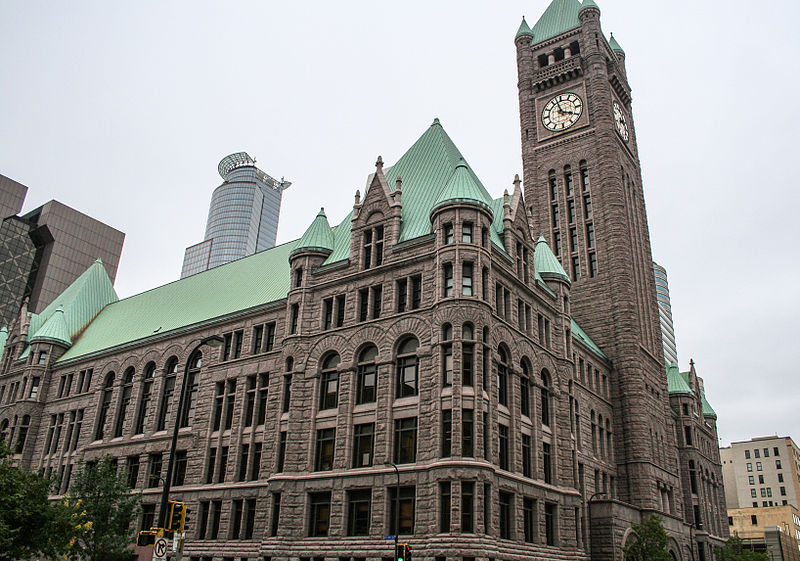Minneapolis voters will not decide on a charter amendment in November to remove the city's police department and replace it with a Department of Community Safety and Violence Prevention. On August 5, the Minneapolis Charter Commission voted 10-5 to take an additional 90 days to evaluate the proposal.
This effectively blocked the measure from the November 2020 ballot, although it could still appear on a later ballot. The city council's deadline to add the measure to the November 2020 ballot is August 21. The city council is not able to vote on the measure until the charter commission returns it.
- Removed all references to the city's police department from the city charter.
- Added a section establishing the Department of Community Safety and Violence Prevention, and the director of the new department.
- Allowed a Division of Law Enforcement Services within the new department that would have been made up of licensed peace officers and would have had a director appointed by the director of the Department of Community Safety and Violence Prevention.
Under the existing charter provisions, the mayor has authority over the police department and nominates the police chief, who must be confirmed by the city council. The existing charter also requires the city council to provide funding to the police department to provide for "a police force of at least 0.0017 employees per resident."
This proposed amendment would have made the city council responsible for establishing and funding the proposed Department of Community Safety and Violence Prevention and given the city council authority to establish the Division of Law Enforcement Services within the department. The director of the proposed Department of Community Safety and Violence Prevention would have been nominated by the mayor and confirmed by the city council.
Following the killing of George Floyd and the resulting demonstrations and protests, the Minneapolis City Council voted unanimously on June 26, 2020, to send the proposed charter amendment to the Minneapolis Charter Commission for review. Under the process for charter amendments set by state law, the charter commission must review proposed amendments and make recommendations to the city council. The city council does not have to follow the commission’s recommendation, but cannot vote to send a charter amendment to the ballot until the recommendation is made. The charter commission has a maximum of 150 days to review proposals from the city council.
The charter commission considered its own amendment that would have removed the minimum funding requirement for the police department from the charter. On July 29, the charter commission voted 8-6 against referring it to the ballot.
Charter Commissioner Gregory Abbott said, "[the charter] should not be cluttered up with the policy disputes of the moment. We don’t know what challenges the city will face in 10 years or 20 years or even in 50 years. It [the charter amendment] proposes permanently moving the city’s law enforcement function down to a sub-department two levels removed from supervision by elected officials. The council’s proposal even specifies the professional qualifications of the head of the new department, details more appropriate in my opinion for a zip recruiter ad than for a charter provision. Now these ideas may well be good under the circumstances but they should be enacted as part of an ordinance not included in the charter itself. There is another problem I have with the charter amendment. The proposal radically reduces the power of the mayor and transfer those powers in their entirety to the city council."
Councilmember Jeremiah Ellison responded to the commission's vote, "It is our legacy in the US to use voting to decide our future, whether that be by representative democracy or direct democracy. It is not our legacy to use bureaucratic processes to circumvent the people in an attempt to 'protect' voters from themselves. That is not democracy. In a democracy, the people decide. But I guess today the Charter Commission decided otherwise."
Mayor Jacob Frey, who opposes the charter amendment, said, "I look forward to working with Chief Arradondo, my council colleagues, and community to transform the culture of policing in our city in the months ahead. Now it is on all of us to roll up our sleeves and dig into this work together."
This is not the first time that the Minneapolis City Council has proposed a charter amendment concerning the police department, and the charter commission has declined to expedite its review to meet a general election deadline. On August 3, 2018, the Minneapolis City Council voted 7-5 to send a charter amendment proposal to the Minneapolis Charter Commission that would have repealed provisions in the charter giving the mayor complete control over the city's police department. The measure would have, instead, allowed rules and regulations for the police department to come from both the city council and the mayor. The charter commission did not make a recommendation to the city council in time for the city council to put the measure on the November 2018 ballot. Instead, the commission ordered a task force to create a report on the proposal. The commission ultimately recommended against the charter amendment in January 2019.
In the weeks after George Floyd was killed by Minneapolis, Minnesota, police officer Derek Chauvin on May 25, 2020, nationwide demonstrations and protests were held calling for changes to policing. Officials responded by issuing executive orders and passing legislation to eliminate certain policing tactics, such as chokeholds, and implement new community policing strategies.
Voters in at least half a dozen cities and counties—including San Francisco, Los Angeles County, and Sonoma County, California; King County, Washington; Philadelphia and Pittsburgh, Pennsylvania; Columbus, Ohio; and Portland, Oregon―will decide ballot measures in November concerning law enforcement oversight, structure, funding, policies, and staffing levels. Stay tuned to Ballotpedia for an overview of this ballot measure trend as it develops.


